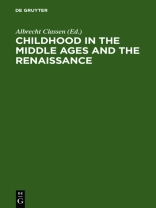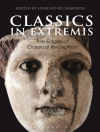Earlier theses on the history of childhood can now be laid to rest and a fundamental paradigm shift initiated, as there is an overwhelming body of evidence to show that in medieval and early modern times too there were close emotional relations between parents and children. The contributors to this volume demonstrate conclusively on the one hand how intensively parents concerned themselves with their children in the pre-modern era, and on the other which social, political and religious conditions shaped these relationships. These studies in emotional history demonstrate how easy it is for a subjective choice of sources, coupled with faulty interpretations – caused mainly by modern prejudices toward the Middle Ages in particular – to lead to the view that in the past children were regarded as small adults. The contributors demonstrate convincingly that intense feelings – admittedly often different in nature – shaped the relationship between adults and children.
Cuprins
Albrecht Classen: Philippe Aries and the Consequences: History of Childhood, Family Relations, and Personal Emotions: Where do we stand today? Valerie L. Garver: The Influence of Monastic Ideals upon Carolingian Conceptions of Childhood; Eva Parra Membrives: Mutterliebe aus weiblicher Perspektive: Zur Bedeutung von Affektivität in Frau Avas Leben Jesu (Maternal Love from a Female Perspective: On the Significance of Affection in Frau Ava’s Leben Jesu); Diane Peters Auslander: Victims or Martyrs: Children, Anti-Semitism, and the Stress of Change in Medieval England; Mary Dzon: Joseph and the Amazing Christ-Child of Late-Medieval Legend; Karen K. Jambeck: The Tretiz of Walter of Bibbesworth: Cultivating the Vernacular; Nicole Clifton: The Seven Sages of Rome, Children’s Literature, and the Auchinleck Manuscript; Juanita Feros Ruys: Peter Abelard’s Carmen ad Astralabium and Medieval Parent-Child Didactic Texts: The Evidence for Parent-Child Relationships in the Middle Ages; David F. Tinsley: Reflections of Childhood in Medieval Hagiographical Writing: The Case of Hartmann von Aue’s Der arme Heinrich; Carol Dover: Why Did Lancelot Need an Education? Tracy Adams: Medieval Mothers and their Children: The Case of Isabeau of Bavaria; Marilyn Sandidge: Changing Contexts of Infanticide in Medieval English Texts; Jean E. Jost: Medieval Children: Treatment in Middle English Literature; Daniel F. Pigg: Margery Kempe and Her Son: Representing the Discourse of Family; Juliann Vitullo: Fashioning Fatherhood: Leon Battista Alberti’s Art of Parenting; Laurel Reed: Art, Life, Charm and Titian’s Portrait of Clarissa Strozzi; David Graizbord: Converso Children Under the Inquisitorial Microscope in the Seventeenth Century: What May the Sources Tell us about Their Lives? Allison P. Coudert: Educating Girls in Early Modern Europe and America; Christopher Carlsmith: The Child in the Classroom: Teaching a Course on the History of Childhood in Medieval/Renaissance Europe
Despre autor
Albrecht Classen ist University Distinguished Professor an der University of Arizona, Department of German Studies, Tucson, AZ, USA.












